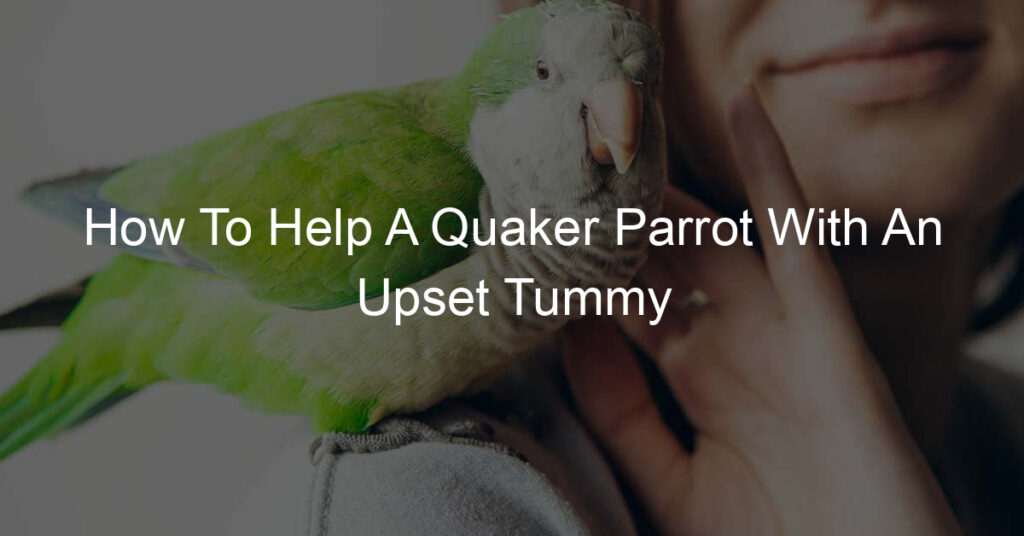Quaker parrots are one of the most popular pet birds out there, and they come with their own set of unique needs. At some point, you may face a daunting challenge: helping a Quaker parrot recover from an upset tummy.
The good news is that it doesn’t have to be difficult or take long at all – if you know what to do and follow best practices, your feathered friend will soon be well on their way to recovery.
In this blog post, we’ll explain exactly how to help your Quaker parrot overcome an upset stomach and get back into peak health as quickly as possible!
What to do if my parrot has diarrhea?
Keeping your parrot healthy and happy is priority number one. If your parrot has diarrhea, it’s important to take the correct measures.
First, it’s vital to keep the cage clean, making sure you immediately remove any soiled areas and clean them with disinfectants made specifically for parrots. Make sure to use mild soap and water to avoid irritation.
Secondly, check your bird’s diet as dietary issues can sometimes lead to stomach problems like diarrhea. You may need to adjust their diet or provide fiber-friendly treats like apples or leafy greens in their food.
Lastly, if the problem persists, take your bird to an avian vet for a checkup. A professional can help diagnose any underlying conditions and give more specific advice on how to treat your parrot and get them back in tip-top shape!
What can I give my Quaker parrot for pain?
If your Quaker parrot is in pain, you may be wondering what relief you can offer. Fortunately, there are several things you can do to help your feathered friend feel better.
Pain medications such as meloxicam and aspirin are safe for birds and can be administered carefully with a veterinary prescription. On top of this, many artificial preening oils exist that can rub on the feet and both sides of the beak to reduce discomfort in sore areas.
Additionally, keeping an eye out for any changes in behavior or eating habits can give your bird a better chance at a quick recovery. Finally, providing ample rest and undisturbed healing time will help your Quaker parrot recuperate sooner rather than later.
Why does my Quaker parrot have diarrhea?
Unlike humans, parrots require frequent changes in their diet to maintain a healthy and balanced nutritional intake.
If your Quaker parrot has recently been given a sudden change in its diet, or if your bird has been eating the same thing for weeks or months on end, it may be suffering from diarrhea due to the lack of fresh fruits and vegetables.
Additionally, the presence of an illness or parasite, such as canker or giardia, could be responsible for your parrot’s watery stools. You should always consult a veterinarian if you notice changes in your parrot’s stool to ensure that proper treatment is prescribed which will help clear up their digestive issues and keep them healthy.
How can I help my sick parrot?
Taking care of a sick parrot requires the same dedication and effort as caring for any other ill pet. It is essential to consult a veterinarian before providing any home remedies.
A few familiar measures that owners can take to ensure the health and comfort of their feathered friend include making sure the parrot lives in an environment with plenty of ventilation, providing fresh and nutritious food, avoiding exposure to pollutants, and monitoring changes in temperature or animal behavior.
Additionally, it’s important to pay attention to the specific needs of your parrot: closely observe any significant changes, address dietary issues, encourage them to be active and move around enough, properly clean their cage, and provide mental stimulation with social interactions. With the right care and attention all along, you will soon have your beloved parrot back on its feet!
Final Thoughts
The key to helping a Quaker parrot with an upset tummy is proper care, diet, and understanding. Prevention is the best medicine and keeping your Quaker Parrot in its natural environment can go a long way toward preventing potential health problems. If any issues do arise, you should be able to diagnose the issue quickly if you know what to look for and how their body works.
Staying on top of your pet’s general health and providing a healthy diet that provides proper vitamins, minerals, and proteins will foster happy, healthy birds, who are much less likely to have an upset tummy.
With a little patience and love a Quaker parrot can bring many years of joy into your life, so don’t forget that it’s ultimately worth the effort and that these loveable birds depend on us humans to provide them with all they need.








